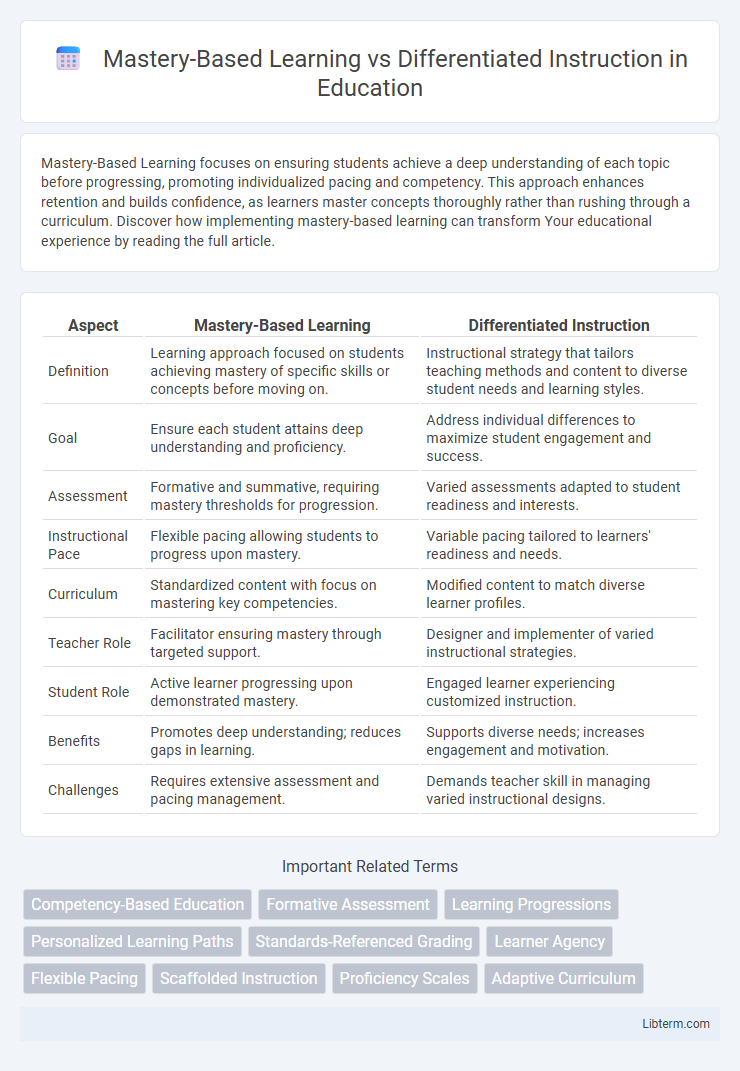Mastery-Based Learning focuses on ensuring students achieve a deep understanding of each topic before progressing, promoting individualized pacing and competency. This approach enhances retention and builds confidence, as learners master concepts thoroughly rather than rushing through a curriculum. Discover how implementing mastery-based learning can transform Your educational experience by reading the full article.
Table of Comparison
| Aspect | Mastery-Based Learning | Differentiated Instruction |
|---|---|---|
| Definition | Learning approach focused on students achieving mastery of specific skills or concepts before moving on. | Instructional strategy that tailors teaching methods and content to diverse student needs and learning styles. |
| Goal | Ensure each student attains deep understanding and proficiency. | Address individual differences to maximize student engagement and success. |
| Assessment | Formative and summative, requiring mastery thresholds for progression. | Varied assessments adapted to student readiness and interests. |
| Instructional Pace | Flexible pacing allowing students to progress upon mastery. | Variable pacing tailored to learners' readiness and needs. |
| Curriculum | Standardized content with focus on mastering key competencies. | Modified content to match diverse learner profiles. |
| Teacher Role | Facilitator ensuring mastery through targeted support. | Designer and implementer of varied instructional strategies. |
| Student Role | Active learner progressing upon demonstrated mastery. | Engaged learner experiencing customized instruction. |
| Benefits | Promotes deep understanding; reduces gaps in learning. | Supports diverse needs; increases engagement and motivation. |
| Challenges | Requires extensive assessment and pacing management. | Demands teacher skill in managing varied instructional designs. |
Understanding Mastery-Based Learning
Mastery-Based Learning emphasizes students achieving a deep understanding of specific skills or concepts before progressing, ensuring competency at each stage of the curriculum. This approach allows personalized pacing, where learners demonstrate mastery through assessments and receive targeted support until they meet predefined criteria. By focusing on mastery, educators can foster long-term retention and higher academic achievement compared to traditional time-based instruction models.
Defining Differentiated Instruction
Differentiated instruction is an educational approach that tailors teaching methods, content, and assessment strategies to accommodate students' diverse learning needs, preferences, and abilities within the same classroom. It emphasizes flexible grouping, varied materials, and multiple modes of instruction to ensure all students achieve their full potential. This approach contrasts with mastery-based learning, which focuses on students progressing only after demonstrating competency in specific skills or knowledge.
Core Principles: Mastery vs Differentiation
Mastery-Based Learning emphasizes student progression through demonstrating mastery of specific skills or concepts before advancing, ensuring a solid understanding and personalized pace. Differentiated Instruction focuses on tailoring teaching methods and materials to accommodate diverse learning styles, abilities, and interests within the same classroom environment. The core principle of Mastery-Based Learning is achieving competence in key learning objectives, while Differentiated Instruction centers on varied instructional strategies to meet individual learner needs.
Assessment Approaches Compared
Mastery-based learning utilizes formative assessments to ensure students achieve a high level of understanding before progressing, emphasizing individualized pacing and clear mastery criteria. Differentiated instruction employs varied assessment methods, such as performance tasks and informal checks, to accommodate diverse learning styles and readiness levels within the same classroom. Both approaches prioritize ongoing feedback, but mastery-based learning focuses more on mastery checkpoints, while differentiated instruction adapts assessments to meet student needs dynamically.
Personalization in Learning Paths
Mastery-Based Learning emphasizes student progression upon achieving a deep understanding of content, creating personalized learning paths tailored to individual pace and mastery levels. Differentiated Instruction adapts teaching methods and materials to diverse learner needs within the same classroom, providing varied access points but often following a shared curricular timeline. Personalization in learning paths under Mastery-Based Learning offers more precise adjustment to learner competency, whereas Differentiated Instruction balances variety with standard curricular goals.
Role of Teacher in Each Model
In Mastery-Based Learning, the teacher functions as a facilitator who continuously assesses student progress and provides individualized support until mastery is achieved, ensuring that learners fully understand each concept before moving forward. In Differentiated Instruction, the teacher acts as a designer and implementer of varied instructional strategies, tailoring content, process, and products to meet diverse learning needs within the same classroom. Both models require teachers to be adaptive and responsive, but Mastery-Based Learning emphasizes ongoing assessment and remediation, whereas Differentiated Instruction focuses on proactively addressing varied learner profiles.
Tracking Student Progress and Outcomes
Mastery-Based Learning tracks student progress through competency completion, allowing personalized pacing to ensure thorough understanding before advancement. Differentiated Instruction monitors student outcomes by tailoring teaching methods to diverse learning styles and readiness levels within a single classroom. Both approaches emphasize continuous assessment but differ in their focus on individual mastery versus adaptive instructional strategies.
Addressing Diverse Learner Needs
Mastery-Based Learning ensures students achieve a deep understanding of content before progressing, allowing personalized pacing that accommodates individual learning gaps and strengths. Differentiated Instruction adapts teaching methods, materials, and assessments to suit varied learning styles and readiness levels within a single classroom environment. Both approaches prioritize addressing diverse learner needs by promoting flexibility and targeted support to optimize student outcomes.
Benefits and Challenges of Each Approach
Mastery-Based Learning ensures students achieve a high level of understanding before progressing, promoting deep comprehension and individualized pacing but can require extensive assessment and resource allocation. Differentiated Instruction tailors teaching methods to diverse learner needs, enhancing engagement and accommodating varying abilities, yet it demands significant teacher expertise and classroom management skills. Both approaches aim to boost student success but present unique implementation challenges related to time, training, and assessment strategies.
Choosing the Right Model for Your Classroom
Mastery-Based Learning emphasizes student competency by allowing learners to progress only after demonstrating understanding, ensuring a solid grasp of material before advancing. Differentiated Instruction tailors teaching strategies to individual learners' needs, preferences, and readiness, fostering engagement and addressing diverse learning styles simultaneously. Selecting the appropriate model depends on classroom goals, student diversity, and assessment resources, with mastery-based learning suited for skill mastery and differentiated instruction ideal for heterogeneous groups.
Mastery-Based Learning Infographic

 libterm.com
libterm.com